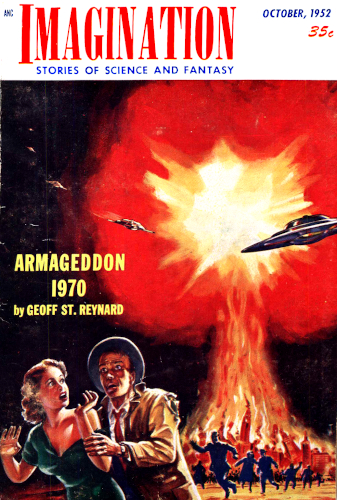
ARMAGEDDON, 1970
By Geoff St. Reynard
As atomic weapons from space laid waste to
Earth's cities, Alan Rackham searched for the
traitors. Was it possible he sought himself?
[Transcriber's Note: This etext was produced from
Imagination Stories of Science and Fantasy
October 1952
Extensive research did not uncover any evidence that
the U.S. copyright on this publication was renewed.]
They tried to kill Alan Rackham about an hour after he had seen theaccident. They bungled the job. They shot at him from ambush—withan ordinary automatic pistol—as he was walking up to his house; andBrave, who had a sixth sense for danger which never failed him, knockedAlan over at the very instant of the shot and sprawled across him, agreat solid shield holding him down and protecting him despite hisangry wrigglings. Brave's grenade pistol was in his hand before thetwo of them hit ground, and he sent four quick shots at the bushes,spaced so that the tiny hot fragments tore hell out of thirty yards ofshrubbery. Nobody yelled or groaned. Brave waited a full minute, andthen he rose cautiously, so that Alan could sit up and brush himselfoff and swear as he spat out dirt. They went into the house and Alanreported the assassination attempt to his immediate superior, Dr.Getty. After that they didn't try again to kill Alan for a long time.
The accident had been uncanny. It happened in the room where the shellsof the silver-colored disks were fitted together and welded, beforethey were sent to the gargantuan baths that half-melted them again torechill them into solid masses of metal which nothing short of a directhit by a blockbuster would crack.
A welder, using one of the newly-developed torches that made the oldones seem like match-flares by comparison, dropped it accidentally. Itsflame licked up and sprayed across the man's right hand. It melted theprotective glove like ice cream on a stove; crisped away the skin andliquefied the flesh, charred the bones black and left the welder nomore than half a palm and two fingers before he could jerk his hand outof the terrible blast of fire.
Alan and Brave were standing about twelve feet off, and there could beno mistake as to what they saw then.
The welder turned off his torch with his left hand; he held the remainsof his right before his face, turned it and stared at it (the bloodcoursing in little sluggish streams down the forearm, the charcoalthat had been bone sifting off into the air, the flesh a greasyyellow-red mass like candle drippings), and he shook his head slowly,an expression of annoyed mortification on his face. It was as though hehad cut himself while shaving, no more. He was simply piqued, when heshould have been shrieking with horror and unendurable pain.
Alan and Brave ran to him. "My God, man," said Alan, shaken, "let meget you to infirmary."
The welder stood up. "That's all right, Dr. Rackham. I can go myself.This don't hurt." And then a curious look spread over his face, as ifhe had just recollected a lesson taught him long ago. "It don't hurtmuch," he amended. "I guess it's cauterized so bad I can't feel ityet. Don't you worry, sir, I can make it."
He walked away, perfectly steady, carrying the almost destroyed handin front of his chest; and Alan was so dumbfounded he let him go.
The welder never reached the infirmary. No man saw him again, alive ordead.
So an hour thereafter someone took a shot at Alan Rackham. SinceBrave had witnessed the accident too, and because nei